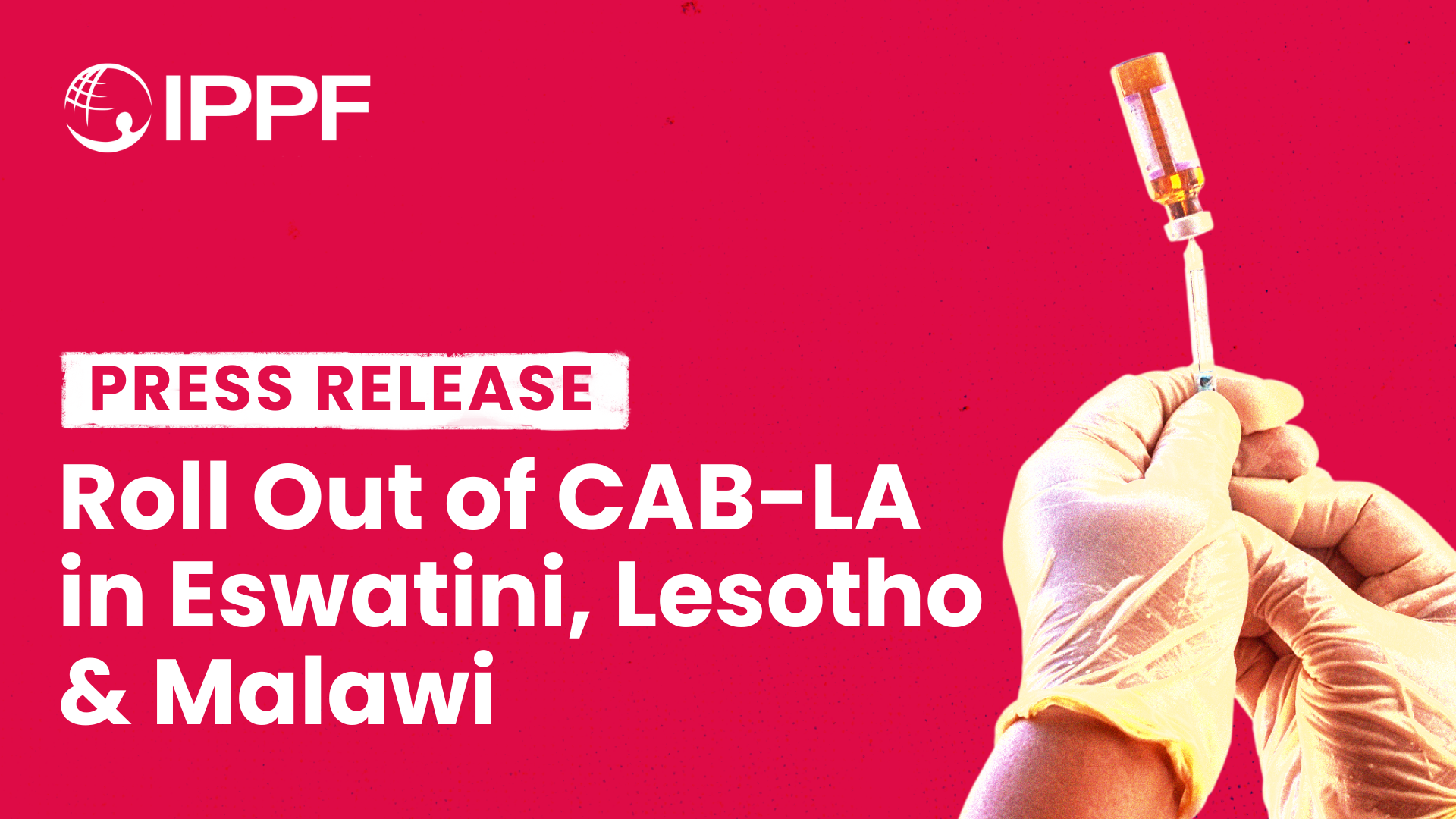Latest press releases
A selection of stories from across the Federation

US Government Expands Global Gag Rule in a Major Escalation of Regressive Foreign Policy
FOR IMMEDIATE RELEASE
For media enquiries
Telephone:
+44 7918 845944Email IPPF:
Email: media@ippf.org

| 27 June 2025
Amid Devastating Budget Cuts, Groundbreaking HIV Prevention Injectable Launches in Eswatini, Lesotho & Malawi
30 June 2025 - The International Planned Parenthood Federation (IPPF) is proud to announce the roll out of CAB-LA (cabotegravir-long acting), a form of pre-exposure prophylaxis (PrEP) for HIV, in Eswatini, and Malawi, and a pilot project in Lesotho - a major milestone in the fight against HIV. IPPF Member Associations (MAs) in the three countries - Family Life Association of Eswatini (FLAS), Lesotho Planned Parenthood Association (LPPA), and Family Planning Association of Malawi ( FPAM) will soon begin to distribute CAB-LA for HIV prevention to individuals who would like to use this form of HIV prevention. CAB-LA, a long-acting injectable PrEP, is a game changer for HIV prevention. PrEP is an HIV prevention method where HIV-negative individuals take medication to significantly reduce their risk of acquiring HIV. Administered every 8 weeks, CAB-LA greatly reduces infection risk and does not rely on remembering to take a daily pill, addressing adherence challenges faced by some people using oral PrEP. This roll-out comes when US budget cuts have severely impacted governments and organizations providing sexual and reproductive health services, HIV prevention, and humanitarian aid. These financial restrictions have significantly impacted access to essential sexual and reproductive health medications globally, compromising HIV prevention and treatment for many, especially those most in need. The arrival of CAB-LA is a major step forward in the fight against HIV/AIDS, providing longer-term protection, a more convenient option, and a discreet alternative to daily pills. Family Life Association of Eswatini, Lesotho Planned Parenthood Association, and the Family Planning Association of Malawi will be providing CAB-LA for PrEP through their static clinics and other public service delivery points. This effort underscores the vital role our MAs play in securing and delivering universal access to sexual and reproductive healthcare. For more information, please contact media@ippf.orgAbout the International Planned Parenthood Federation IPPF is a global healthcare provider and a leading advocate of sexual and reproductive health and rights (SRHR) for all. Led by a courageous and determined group of women, IPPF was founded in 1952 at the Third International Planned Parenthood Conference. Today, we are a movement of 158 Member Associations and Collaborative Partners with a presence in over 153 countries. Our work is wide-ranging, and includes services for sexual health and well-being, contraception, abortion care, sexually transmitted infections and reproductive tract infections, HIV, obstetrics and gynecology, fertility support, sexual and gender-based violence, comprehensive sex education, and responding to humanitarian crises. We pride ourselves on being local through our members and global through our network. At the heart of our mission is the provision of – and advocacy in support of – integrated healthcare to anyone who needs it regardless of race, gender, sex, income, and, crucially no matter how remote.

| 19 June 2024
IPPF Statement on the Ongoing Violence in Haiti
Haz click aquí para leer este posicionamiento en español The International Planned Parenthood Federation (IPPF) is deeply concerned about the escalating violence and political instability in Haiti, particularly its disproportionate impact on women and girls since March 2024. This crisis is expected to leave 3,000 pregnant women without essential medical care, leading to nearly 450 women experiencing life-threatening childbirth complications. With almost 580,000 Haitians displaced, women and girls are experiencing an alarming surge in sexual and gender-based violence (SGBV), including rampant sexual assaults, torture, and collective rape by armed groups. From January to March 2024, there were 1,793 SGBV incidents reported. Conflict-related insecurity has also significantly increased negative coping mechanisms, contributing to the rise in SGBV, as well as sexually transmitted infections and HIV. The ongoing violence is preventing access to essential sexual and reproductive healthcare services, endangering the lives of mothers and newborns. Our partner in Haiti, the Haiti Midwives Association, informed us, ‘the gangs prohibit the movement of motorcycles and pedestrians, threatening and sometimes shooting in the air to terrorise us further. Due to these difficult conditions, fewer and fewer patients are attending the hospital, whether for prenatal consultations, deliveries or postnatal care.” This inaccessibility has led to a significant increase in maternal and infant mortality. Eugenia López Uribe, Regional Director of the IPPF Americas & the Caribbean, said, “Humanitarian aid must be granted access through local organisations, such as our partner the Haiti Midwives Association, and their wellbeing must be guaranteed in this process. Women and girls can no longer wait! Our partner has provided access to vital emergency services such as pregnancy, childbirth and postpartum care, as well as care after sexual violence for 20 years. However, since February, they have been forced to stop their activities because of the imminent risks they face as women living in Port-au-Prince and surrounding areas.” On this International Day for the Elimination of Sexual Violence in Conflict, IPPF calls for zero tolerance toward any form of SGBV and demands the immediate protection of Haitian women, children, and those most at risk. We strongly call for unhindered humanitarian access to allow aid into Haiti. This aid must be designed and controlled by local NGOs and aid workers, and any foreign peacekeepers must safeguard and protect local communities - in particular their sexual and reproductive rights - so mistakes of the past are not repeated. Let’s not forget: Haiti's poverty and instability has been shaped by decades of foreign occupation and colonialism. The international community owes Haiti more than mere condolences; they owe an unwavering commitment to a future where human rights, including sexual and reproductive health rights are respected and protected, and nobody is left behind.
















